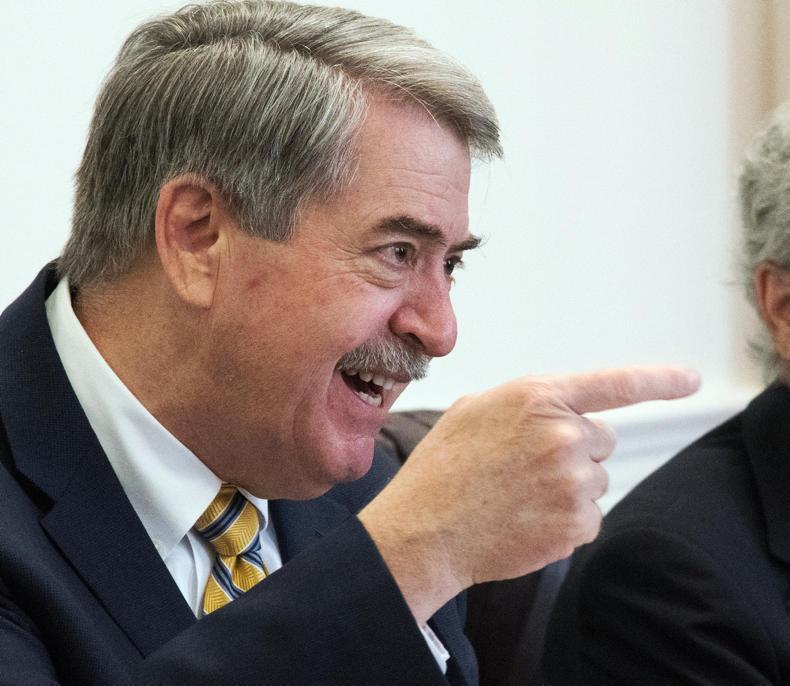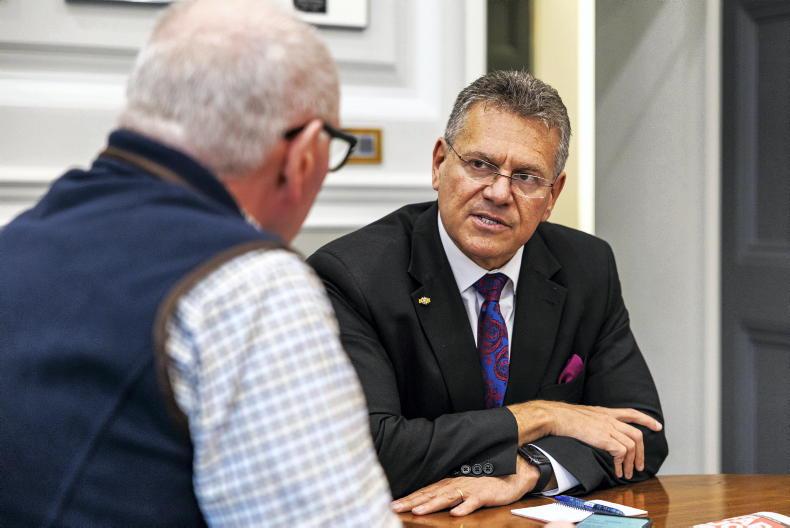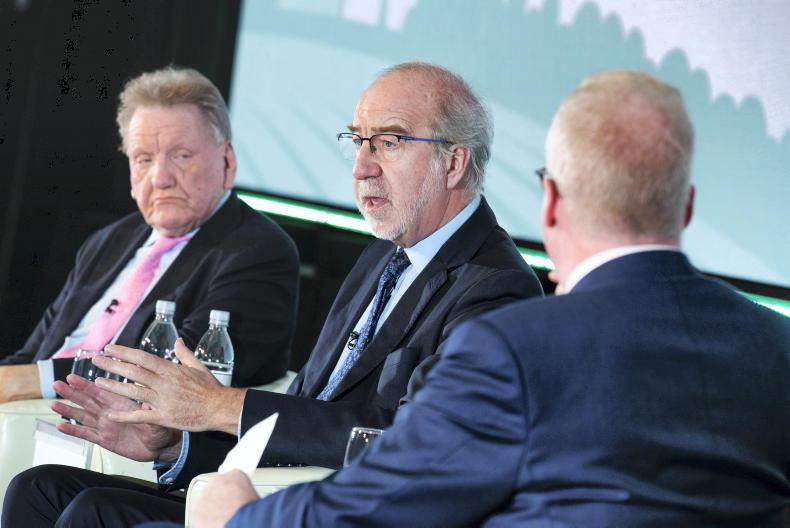Phelim O’Neill – You started by explaining your Scotts-Irish credentials to us. Looking in from the USA, as an observer, what view do you take of the Breixt process and the UK decision to leave the EU? It is outside your policy remit, but I would be interested in your observations from a distance.
Ted McKinney – We don’t take a position as a US Government. That is a UK or an UK-EU decision, so we are not going to pass judgement on the strengths, weaknesses, rights or wrongs of that. Our goal is to simply to have fair, free and reciprocal trade with whatever entity or country that wishes to do business. We hope there is not disruption. We love you in Ireland we love our cousins in the UK as well. So we hope there is no disruption, there is always turbulence and bumps in the road but sometimes they get straightened out and, if Brexit does occur, I hope those are minimal and the countries involved can move through those quickly and we are going to be honest observers on the sideline until a final decision is made.
PON – I listened with interest this morning to your presentation on the role of the USA today in global trade. You will be aware that you are coming under some challenge in international media, but you defend the approach of the USA to trade?
TMcK – Yes, if you are speaking of seeking free, fair and reciprocal trade, yes I will defend it 24/7… The US is not seeking anything other than free, fair and reciprocal trade, and for the last 20 years there have been a lot of reasons, sanitary and phytosanitary and non-tariff trade barriers have entered in. The farmers and the ag community very much support the president in his efforts to – in my words – “right-size this”. Once that is done, fantastic: let us get on with good free, fair and reciprocal trade.
PON – Looking at this from the European perspective, where there are different rules of production that EU farmers have to adhere to, we look at the US, and you would looking at the cost of your farm bill having a fairly heavily supported agriculture as well?
TMcK – I have to go back and do the numbers; I’m not sure I agree with that. We got rid of a lot of what you and I would call “subsidies” in the 1996 farm bill. We have an insurance programme that is on its way to being self-funded, that is the goal, at least. There are programmes that help with environmental stewardship. Remember that the school nutrition programme is 80% of our farm bill: that is strictly the food-stamp-type programmes that address the hungry…
PON – But would you not accept that is a de facto market-support system? You are buying food of American farmers to circulate among – admittedly the poorer – sectors of society, but it is a very solid market-support system for farmers?
TMcK – At a very small level, relatively speaking. Your question makes it sound like that is the totality and there is that very modest part, but those buys are a pittance compared with the overall budget. We do support those in need, those that go to food banks, some are on school nutrition assistance, you bet, no different than others – but in comparison to the total budget it is a very small portion.
PON – It is interesting in the environment of the Agricultural Science Association (ASA) conference – you will recall that the USA successfully took the EU to WTO on the use of hormones in beef production. That has come around again recently. The solution at the time was the creation of the high-quality beef quota, I am not sure if you are familiar with the detail…
TMcK – I am…
PON – Just this week now, the EU Commission has said they are going to engage in discussion with you on that. It is a 45,000t quota and I know the USA grievance is around how your share has diminished over the years. What is the level of that 45,000t quota that you think would be fair for the USA?
TMcK – That is a discussion for the US trade reps with the EU Commission, but I would think the majority because that was really designated for the US and – rightly or wrongly – three, four, five other countries got in there. So we are not seeking something that is unfair: the decision was made specifically for a US grievance at WTO, so we believe this is the right thing to happen and we are coming to the point where we should have been several years ago.
PON – On the issue of WTO, your president has at least misgivings about it. Do you see a future for WTO regulating global trade in the years ahead?
TMcK – I don’t know what the president’s exact position is, we would say that WTO does need to be modernised, absolutely and unequivocally. And I would guess that most countries around the world would say that as well. So we believe that there has got to be a set of rules that trade follows, there has got be an opportunity to surface grievances, but it cannot take three to five years and cost millions and millions of dollars or euros – that is the part that is broken and needs fixing.
PON – It was interesting to listen to your observations on China this morning. Ireland has just commenced trade in agri with China. You seem to caution on the loss of intellectual property to China in plant and animal genetics. Is that something you would advise Ireland and Irish farmers to be ever more mindful of, as we engage more and more with China?
TMcK – I would encourage trade, firstly. It is good to trade and you need those markets but, yes, I would exercise some caution, and I would think that all of the EU understands that. That is why I think the EU has come together with the US and Japan on how we engage with China on these less-than-honest nefarious practices. Yes, I would encourage some caution.
PON – On the issue of Canada, I listened with interest to your comments and observations on the Canadian dairy sector and their protective measures. I think that is something that the EU would have found interesting from our engagements through the CETA agreement. Do you think you will get a resolution with Canada within a few weeks, as you did with Mexico?
TMcK – With Canada, I do believe we will get there, but I don’t know if that will be in weeks, days or months. The trading relationship and the cultural relationship between the US and Canada is extremely close. They are our neighbours; they are our friends. However, on trade we would strongly disagree with some of the behaviour. We didn’t go and initiate class six or class seven milk. We did not do that, they did. And if they are going to manage their milk supply, then please manage it, but you can’t say no to milk or dairy coming in from a country – in this case the US – and then create a greater opportunity for your own farmers and dump milk powder and butter on the global market. That is not fair.
PON – There are just a couple of other things. You referenced the theme of the conference as trade wars, consumer confidence – you challenged the word “war”. You don’t see us entering into a prolonged period of national protectionism? You think this will be a short, sharp realignment?
TMcK – Honestly, I don’t know. I can tell you what I hope for and what I know we are working towards, and that is to get it settled. If those who have not been fair, free or reciprocal in trade realise we have got to straighten this out, then it can be a very short dispute. Some are seeing that sooner than others. We have to come to a resolution, otherwise this slippery slope will continue to get even more slippery – and that is not a productive thing for either of us.
PON – If we look back in history, over the past century, it was the freeing up of global trade that drove the expansion of the 20th century, and the fear is that we regress from that and move to a situation where everyone looks after their own.
TMcK – I hope that is not the case. The world has benefited immensely from free trade. What we are trying to do now is trying to get fair, free and reciprocal trade. That is the only goal we seek – and the sooner we get there the better.
PON – Thank you, Under Secretary
TMcK – Thank you very much, good to talk to you.









SHARING OPTIONS